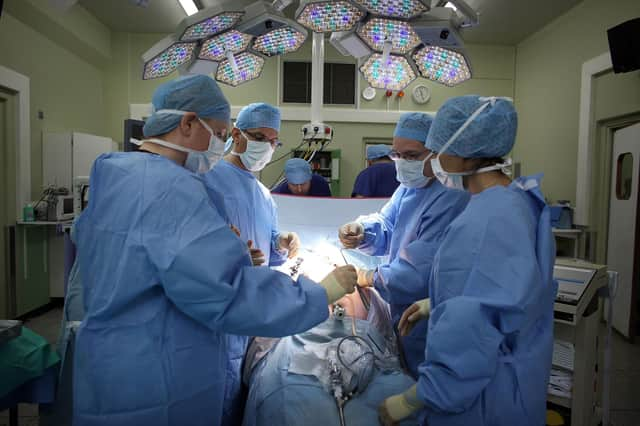Why migration and the NHS are crucial to UK's economic growth – John McLaren


Another is that the reason such migrants are so essential is to help compensate for the rising number of potential workers who are ‘economically inactive’ due to long-term sickness.
The numbers are quite dramatic. Taking migration first, the OBR has increased annual migration forecasts by 60 per cent, to over 200,000 a year up to 2027.
Advertisement
Hide AdAdvertisement
Hide AdThis is well above stated targets and, given the way the OBR closely co-operates with the UK Government, must have been acknowledged in discussions leading up to the Autumn Statement. The OBR states: “This upward revision reflects evidence of sustained strength in inward migration since the post-Brexit migration regime was introduced... and reflects discussions with the Home Office’s Migration Advisory Committee over what levels of net migration for the next several years might be consistent with the current migration regime.”
This leaves the UK Government’s position over immigration somewhat confused to say the least. Are such levels acceptable, as the Treasury and Home Office implicitly acknowledge, or unacceptable, as the Prime Minister and the Home Secretary have recently explicitly stated?
The OBR’s higher net migration assumption adds 0.6 per cent to the adult population by 2027, mainly of working age, and pretty much accounts for the rise in employment over the period 2023 to 2027. Furthermore, the OBR says: “Only the higher-than-expected numbers of migrants coming to the UK under the post-Brexit migration regime adds materially to prospects for potential output growth over the coming five years relative to the assumptions that we made in March.”
That’s a pretty strong hint suggesting that, given current conditions, you should take your growth opportunities where you find them. Nevertheless, the negative reaction to record UK inward migration numbers, including by the Labour Party, suggests that a battle awaits over whether or not this growth fillip remains viable.
Moving from the upside of migration to the downside of rising ill health, between February 2020 and August 2022, the number of people in the UK describing themselves as economically inactive rose by 630,000, of which 380,000 described themselves as “long-term sick”.
The sources of this rise are interesting. While older people – over 50 – still make up the majority of those inactive because of long-term sickness, the largest relative increases in recent years have been for those aged 25 to 34, with most citing poorer mental health, as opposed to being Covid related.
The underlying causes of the surge remain unconfirmed but fingers are starting to be pointed at increased NHS waiting lists, including for treatment of mental health issues. Moreover, the greater expansion of hospital waiting lists, compared to other countries, may well be linked to the very poor international performance of the UK labour market, post-Covid.
For Scotland, the inactivity figures look slightly different but still not good. It has not experienced much of an increase over the past couple of years but it did see a big jump up around 2016. Though the patterns are different, at 22 per cent, Scotland has a slightly higher economic inactivity rate than the UK as a whole and there are almost a quarter of a million people categorised as “long-term sick”. On NHS waiting lists, comparisons are tricky, but there is little evidence that Scotland is doing any better than the UK.
Advertisement
Hide AdAdvertisement
Hide AdWhat are the implications of all this? For a start, while in previous recessions the worry has been more about how to get those looking for a job back into work, now it is how to get many of those who are inactive back into looking for work. This puts the emphasis more on reducing NHS waiting lists, not just for operations that allow for a return to physical fitness but also in terms of mental health interventions. Greater funding for community and employer support would also help with the latter.
Fixing the NHS backlog and returning people to activity will also require more of the current job vacancies in the NHS and social care to be filled. The most obvious short-term solution for this is through increased migration, a policy that could also help other industries, like hospitality, to recover. The next few months, leading up to another inevitable UK Spring Budget, will determine whether these sensible routes to recovery will be taken or whether internal party concerns over raised levels of taxation and migration prevail.
In Scotland, the government remains largely a bystander with regards to migration policy, dependent on UK rules. Its aim should be to try and attract as many of the expected future migrants as possible. On inactivity, the Scottish Government has a greater role to play, principally by shortening NHS waiting times, especially in relation to mental health. The latter point is particularly relevant given the £38 million cut to mental health services this year, made by John Swinney at the time of the emergency budget statement. The restoration of this cut would seem to be a minimum requirement, and, ideally, a large funding increase for future years.
The bottom line is that, at present, raised levels of migration are vital to achieving, even unimpressive, economic growth. At the same time, raised health spending is needed to reduce waiting lists to allow domestic workers to get back into work and so raise future economic growth rates.
Brexit and Covid both make such aims more difficult to achieve. We are still in a period of transition from these big economic and social shocks. Governments need to act accordingly.
John McLaren is a political economist who has worked in the Treasury, the Scottish Office and for a variety of economic think tanks
Comments
Want to join the conversation? Please or to comment on this article.